
Hematology Reports
Scope & Guideline
Unlocking the future of hematology research.
Introduction
Aims and Scopes
- Clinical Hematology:
The journal emphasizes clinical research that explores the diagnosis, treatment, and management of hematological conditions, including various anemias, leukemias, lymphomas, and bleeding disorders. - Translational Research:
It publishes studies that bridge laboratory findings and clinical applications, aiming to enhance understanding of hematological diseases and improve therapeutic strategies. - Case Reports and Reviews:
The journal features detailed case reports and comprehensive reviews that contribute to clinical knowledge, providing insights into rare and complex hematological conditions. - Innovative Therapies:
A focus on novel therapeutic approaches, including targeted therapies, immunotherapies, and combination treatments, reflecting the evolving landscape of hematologic treatments. - Epidemiology and Outcomes Research:
Research addressing the epidemiology, risk factors, and outcomes associated with different hematological disorders, contributing to evidence-based practice in hematology.
Trending and Emerging
- COVID-19 and Hematology:
A significant focus on the impact of COVID-19 on hematological patients, including complications, management strategies, and vaccine responses, showcasing the pandemic's influence on research priorities. - Immunotherapy and Targeted Treatments:
An increasing number of studies are dedicated to the exploration of immunotherapy and targeted therapies, such as CAR-T cell therapy and novel agents for hematological malignancies. - Real-World Evidence and Clinical Outcomes:
Emerging interest in real-world data studies that assess treatment patterns and outcomes in diverse patient populations, providing insights into the effectiveness of therapies in practice. - Genomic and Molecular Characterization:
There is a growing trend towards the genomic and molecular profiling of hematological diseases, enhancing personalized medicine approaches and treatment decisions. - Quality of Life and Patient-Centered Research:
Increased emphasis on research assessing quality of life and patient-reported outcomes in hematology, recognizing the importance of holistic patient care.
Declining or Waning
- Traditional Chemotherapy Approaches:
There is a noticeable decrease in studies solely focused on traditional chemotherapy regimens for hematological malignancies, as newer targeted therapies and immunotherapies gain prominence. - Longitudinal Studies on Established Treatments:
Research centered on long-term outcomes of established treatments, like older chemotherapy agents, has diminished, suggesting a shift towards exploring novel and combination therapies. - Basic Science Studies:
The journal has seen fewer publications centered on basic science without direct clinical applications, reflecting a trend towards more clinically relevant and translational research.
Similar Journals
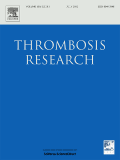
THROMBOSIS RESEARCH
Leading the Charge in Blood Disorder StudiesTHROMBOSIS RESEARCH is a leading peer-reviewed journal in the field of hematology, published by PERGAMON-ELSEVIER SCIENCE LTD. With an impressive impact factor and ranked within the top 10 of 137 in its category according to Scopus, this journal provides a critical platform for the dissemination of innovative research related to thrombosis and hemostasis. Established in 1972, THROMBOSIS RESEARCH has been at the forefront of scholarly communication, addressing key issues, findings, and advancements over more than five decades. Recognized for its high-quality content, the journal is categorized in the Q1 quartile for 2023, reflecting its influence and relevance within the scientific community. Researchers, medical professionals, and students engaged in the study of blood disorders will find valuable insights and the latest discoveries within its pages. Although currently not an open-access publication, THROMBOSIS RESEARCH remains accessible to a wide audience through institutional subscriptions, ensuring that vital research continues to inform and enhance clinical practices around the globe.
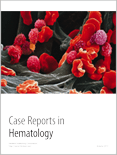
Case Reports in Hematology
Unlocking knowledge to enhance patient care in hematology.Case Reports in Hematology, published by HINDAWI LTD, stands as a prominent open-access journal dedicated to disseminating innovative case reports that contribute significantly to the field of hematology. Established in 2011, this journal provides a vital platform for researchers, practitioners, and clinicians to share detailed observations and novel findings related to blood disorders and treatment responses. With its commitment to high-quality research and accessibility, Case Reports in Hematology aims to enhance the understanding of hematological conditions, fostering collaboration and dialogue among professionals in the discipline. By leveraging an open-access model, the journal ensures that its valuable content is readily available to a global audience, consequently promoting advanced research and improving patient care in hematology. As a testament to its academic rigor and relevance, the journal appeals to its readership, which includes researchers, healthcare professionals, and students eager to expand their knowledge and insights into this critical area of medicine.
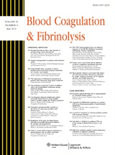
BLOOD COAGULATION & FIBRINOLYSIS
Unraveling the Complexities of CoagulationBLOOD COAGULATION & FIBRINOLYSIS, a distinguished journal in the field of hematology, is published by Lippincott Williams & Wilkins, a reputable name in academic publishing. Since its inception in 1990, this journal has been committed to advancing the understanding of blood coagulation and fibrinolysis, focusing on the molecular mechanisms, clinical implications, and therapeutic aspects of these critical processes. With an impact factor reflecting its significance within the academic community, currently ranking Q3 in both Hematology and Miscellaneous Medicine for 2023, this journal serves as a pivotal platform for researchers and professionals alike. By providing access to cutting-edge research and reviews, BLOOD COAGULATION & FIBRINOLYSIS endeavors to foster collaboration and innovation in the treatment of coagulation disorders. Interested readers can explore ongoing contributions to the field through subscriptions and institutional access options.
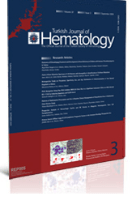
Turkish Journal of Hematology
Empowering the global hematology community through open access.Turkish Journal of Hematology is an esteemed publication dedicated to advancing the field of hematology, producing influential research since its inception in 1999 under the auspices of GALENOS PUBL HOUSE. With an Open Access model, it facilitates widespread dissemination of knowledge, allowing researchers, clinicians, and students to stay abreast of the latest developments in blood disorders and treatments. With an ISSN of 1300-7777 and an E-ISSN of 1308-5263, the journal holds a commendable position in the academic community, evidenced by its 2023 Q3 ranking within the hematology category and its standing at #80 out of 137 in the Scopus database, placing it in the 41st percentile. Covering a wide scope of topics within hematology, this journal serves as a critical resource for disseminating innovative research and clinical practices pertinent to the ongoing challenges faced in this vital area of medicine. With its continuous publication until 2024, Turkish Journal of Hematology remains a beacon for enhancing the understanding and treatment of hematological conditions within the Turkish and global medical communities.
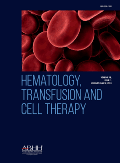
Hematology Transfusion and Cell Therapy
Advancing knowledge in hematology and cell therapy.Hematology Transfusion and Cell Therapy, published by Elsevier, is a leading Open Access journal dedicated to advancing the fields of hematology, immunology, and transfusion medicine. Since its establishment in 2018, this journal has provided a vital platform for sharing innovative research and clinical advancements in the management of blood disorders and cellular therapies. Based in Brazil, it attracts a global audience, facilitating access to high-quality research that influences clinical practice and policy. With a current impact factor that places it in the Q3 category for both hematology and immunology as of 2023, the journal is recognized for its rigorous peer-review process and commitment to disseminating significant findings. By featuring a diverse range of articles, from original research to reviews, Hematology Transfusion and Cell Therapy aims to foster collaboration and knowledge sharing among researchers, professionals, and students alike, empowering them to tackle emerging challenges in their fields.

Journal of Hematology
Elevating Hematology Through Collaborative ResearchThe Journal of Hematology, published by ELMER PRESS INC, serves as a pivotal platform for disseminating cutting-edge research in the field of hematology. With an ISSN of 1927-1212 and an E-ISSN of 1927-1220, this journal is committed to advancing scientific knowledge and clinical practice through high-quality peer-reviewed articles encompassing all aspects of blood disorders, from basic science to health policy implications. While the journal currently operates under a traditional access model, it nonetheless prioritizes the rapid publication of significant findings, ensuring that researchers, clinicians, and students have timely access to the latest advancements in hematological research. Positioned to bridge gaps in knowledge and foster collaboration among scholars worldwide, the Journal of Hematology is an essential resource for anyone invested in this vital area of medicine.

Blood and Lymphatic Cancer-Targets and Therapy
Pioneering Insights into Blood and Lymphatic CancerBlood and Lymphatic Cancer-Targets and Therapy, published by DOVE MEDICAL PRESS LTD, is a vital open-access journal that has been disseminating crucial research and findings in the field of hematology and oncology since 2011. With its ISSN 1179-9889, this journal focuses on the latest therapeutic targets and innovative treatment strategies for blood and lymphatic cancers, contributing significantly to the advancement of knowledge and practice in this specialized area. Designed for researchers, healthcare professionals, and students alike, Blood and Lymphatic Cancer-Targets and Therapy aims to foster a deeper understanding of cancer biology and promote collaborative efforts leading to novel therapeutic interventions. The open-access model ensures that research findings are readily accessible to a global audience, underscoring the journal's commitment to enhancing patient care and fostering educational growth in the cancer domain.

Indian Journal of Hematology and Blood Transfusion
Pioneering Research in Hematology for Tomorrow's HealthcareIndian Journal of Hematology and Blood Transfusion, published by SPRINGER INDIA, serves as a leading platform for disseminating original research, reviews, and case studies in the field of hematology. With an ISSN of 0971-4502 and E-ISSN 0974-0449, this journal has been instrumental in advancing knowledge from 2000 to 2024, providing insights into critical issues surrounding blood disorders and transfusion practices. Currently ranked in the Q3 category for Hematology for 2023, it reflects a commitment to high-quality scientific content amidst a competitive landscape where it ranks 97/137 in Scopus for Medicine - Hematology, placing it in the 29th percentile of its peers. The journal primarily addresses a diverse readership, including researchers, healthcare professionals, and students, aiming to foster innovation and collaboration within the field. Although it operates under a subscription model, access options for individual articles and institutional subscriptions ensure that valuable research is disseminated widely to enhance medical practice and education in hematology.

INTERNATIONAL JOURNAL OF HEMATOLOGY
Fostering Global Insights in Blood ResearchThe INTERNATIONAL JOURNAL OF HEMATOLOGY, published by SPRINGER JAPAN KK, serves as a critical platform for advancing research in the field of hematology. With a prestigious history spanning over three decades from 1991 to 2024, this journal is recognized for its impactful contributions, evidenced by its Q2 category ranking in Hematology for 2023, and its notable position at rank #71 out of 137 in the Scopus Medicine Hematology category. Researchers and professionals within the hematology community benefit from the journal's rigorous peer-reviewed articles that cover a wide range of topics, including clinical studies, basic research, and novel therapeutic strategies. Though currently non-open access, it provides essential insights and findings to an audience passionate about the latest advancements in blood disorders and treatments. Situated in Japan, the journal not only showcases high-quality research but also fosters a global exchange of knowledge in hematology, making it a significant resource for scholars, practitioners, and students alike.
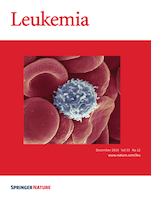
LEUKEMIA
Advancing the Frontiers of Hematology and OncologyLEUKEMIA, published by SpringerNature, is a premier journal in the field of hematology and oncology, with ISSN 0887-6924 and E-ISSN 1476-5551. Established in 1987, this esteemed publication serves as a critical platform for disseminating groundbreaking research and comprehensive reviews on the pathophysiology, diagnosis, and treatment of leukemia and related hematological disorders. With a distinguished impact, it holds a top-tier status in several categories, including Q1 rankings in Anesthesiology and Pain Medicine, Cancer Research, Hematology, and Oncology for 2023. The journal is globally recognized for its rigorous peer-review process and is highly regarded among academia, evidenced by its impressive Scopus rankings—7th in Hematology and 24th in Oncology. Researchers, clinicians, and students alike will benefit from the rich content that this journal offers, making it an invaluable resource in the fight against leukemia. The main objective of LEUKEMIA is to advance knowledge and encourage further innovations within the field, ensuring that vital insights reach practitioners and researchers around the world.